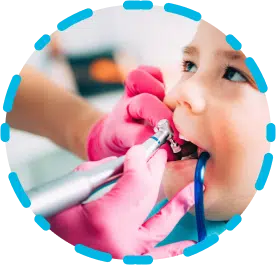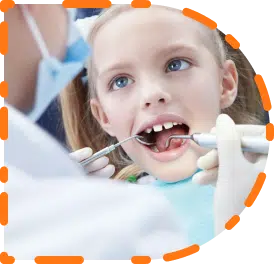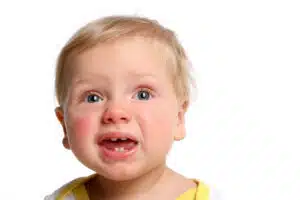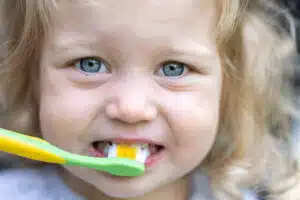Baby teeth, also known as primary teeth, play a significant role in a child’s early years, though they may seem temporary. Understanding why baby teeth are important is more than just about knowing when they fall out. These first sets of teeth lay the groundwork for long-term oral health, speech development, and even facial structure. Without proper care and attention, problems with baby teeth can cause issues that extend well into adulthood.
The Development of Baby Teeth
Baby teeth or primary teeth don’t all come in at once, and their arrival follows a specific timeline. Each tooth plays a unique role as children grow.
Timeline of Baby Teeth Eruption
Typically, the first baby teeth begin to appear around six months of age, though this can vary. These early arrivals are usually the lower central incisors. As a general rule, by the time a child is three years old, they will have a full set of 20 primary teeth. Each tooth erupts in stages, and these teeth follow a fairly predictable pattern, with the lower teeth usually appearing before their upper counterparts.
This process, known as eruption, continues until all the primary teeth have emerged. During this time, teething can cause some discomfort, which parents may help soothe through gentle gum massage or offering a cool teething toy.
Number and Types of Baby Teeth
There are 20 baby teeth in total, which include incisors, canines, and molars. Each type of tooth has its own function. Incisors, which are the front four teeth on the top and bottom, are responsible for biting into food. The canines, which come next, help in tearing food, while the molars, found at the back, are used for chewing and grinding.
These teeth aren’t just useful for eating; they also support jaw development and help children develop clear speech. The importance of primary teeth stretches far beyond their physical presence, serving as placeholders for the adult teeth that will eventually emerge.
Why Are Baby Teeth Important?
Baby teeth are much more than placeholders. They contribute to several key aspects of a child’s physical and emotional development. Here’s why baby teeth should never be overlooked.
A. Speech Development
Baby teeth play a critical role in helping children learn how to speak clearly. When children talk, their tongues, lips, and teeth work together to form sounds. Missing teeth can make it difficult for a child to pronounce certain letters correctly, such as “s” or “th.” This early interaction between teeth and speech helps children develop proper articulation skills, which carry over as they grow and their permanent teeth begin to emerge.
B. Chewing and Nutrition
Chewing properly is essential for breaking down food, which is the first step in healthy digestion. Without their baby teeth, children may struggle to chew certain foods, leading to digestive issues or limited food choices. Primary teeth are specifically shaped to help children grind and chew a variety of foods, making it easier for them to enjoy a balanced diet. Poor chewing due to tooth loss or decay can also lead to nutritional deficiencies if children avoid eating certain healthy foods.
C. Space Holders for Permanent Teeth
One of the most vital roles of baby teeth is their function as space holders for permanent teeth. As the child grows, the roots of primary teeth will naturally dissolve, allowing the adult teeth to push through. If a baby tooth is lost too early, the surrounding teeth may shift into the empty space, making it harder for the permanent teeth to come in correctly. This can lead to misalignment and crowding, which often requires orthodontic treatment later on. Keeping baby teeth in their proper place helps ensure that adult teeth come in where they’re supposed to.
D. Jaw and Facial Development
Baby teeth also contribute to the proper development of the jaw and the overall facial structure. When a child chews food or speaks, the interaction between the teeth and jaw stimulates bone growth. Without baby teeth to guide this process, the jaw may not develop evenly, which can affect facial symmetry and create issues with the bite. Healthy baby teeth support balanced growth, helping to shape a child’s face as they grow.
The Impact of Neglecting Baby Teeth
Neglecting baby teeth can lead to significant problems, both in the short and long term. While some may believe that since these teeth are temporary, their care isn’t as crucial, the truth is that poor maintenance can cause lasting damage to a child’s oral health.
Tooth Decay and Oral Health
One of the most common issues that arise from neglecting baby teeth is tooth decay. Cavities in baby teeth can be painful and may lead to infections. These infections can spread to surrounding teeth or even impact the development of adult teeth beneath the gums.
Left untreated, tooth decay can affect a child’s ability to chew and speak properly, and in severe cases, may require early tooth extraction. This not only causes immediate discomfort but may also lead to alignment issues as other teeth shift into the empty space.
Emotional and Psychological Effects
The pain and discomfort from decayed or damaged baby teeth can affect more than just a child’s physical well-being. Chronic pain or visible issues with teeth, such as discoloration or early tooth loss, may cause embarrassment or lower self-esteem.
Children who experience oral pain may also struggle with concentration at school or avoid participating in activities. Ensuring that baby teeth remain healthy can have a positive impact on a child’s overall happiness and confidence.
Long-Term Effects on Permanent Teeth
Neglecting baby teeth doesn’t just cause immediate problems. When a baby tooth is lost too early due to decay or damage, it can disrupt the natural spacing needed for permanent teeth to grow in correctly. This often leads to overcrowding, misalignment, or bite problems that require orthodontic intervention in the future.
In some cases, children may need braces or other corrective treatments that could have been prevented with proper care of their baby teeth. Keeping these teeth healthy ensures a smoother transition to permanent teeth and helps avoid long-term dental complications.
How to Care for Your Child’s Baby Teeth
Caring for baby teeth is essential for promoting healthy adult teeth and overall oral health. Here are some actionable steps parents can take to protect and maintain their child’s baby teeth.
1. Proper Brushing and Flossing
Parents should start cleaning their child’s teeth as soon as the first tooth appears. Here’s how to maintain good oral hygiene for baby teeth:
- Start brushing early: Use a soft-bristled toothbrush and a smear of fluoride toothpaste for babies.
- Adjust for age: By age three, use a pea-sized amount of toothpaste for brushing.
- Brush twice a day: Make sure to brush in the morning and before bed.
- Introduce flossing: Start flossing once two teeth touch to remove food between them.
- Supervise brushing: Help and supervise brushing until your child can handle it independently, usually by age 6-7.
2. Regular Dental Visits
Dental check-ups should begin early and continue regularly. Here’s what parents can do:
- Schedule the first visit: Bring your child to the dentist by their first birthday or within six months of the first tooth.
- Attend check-ups: Regular check-ups every six months ensure baby teeth are healthy and growing as they should.
- Discuss preventive treatments: Talk to the dentist about fluoride varnishes or dental sealants for added protection against cavities.
- Ask for advice: While looking for belleville pediatric dentistry for Pediatric dentists, they can offer personalized tips on how to care for your child’s teeth at home.
3. Diet and Nutrition Tips
A child’s diet can significantly impact the health of their primary teeth. Here are some guidelines for promoting strong teeth through nutrition:
- Limit sugary snacks and drinks: Reduce the intake of candy, juice, and sodas to prevent tooth decay.
- Encourage tooth-friendly foods: Offer plenty of fruits, vegetables, dairy products (like cheese and yogurt), and leafy greens.
- Provide calcium-rich foods: Foods high in calcium and phosphorus help strengthen tooth enamel.
- Encourage drinking water: Fluoridated water helps wash away food particles and reduces the risk of cavities.
- Offer snacks that naturally clean teeth: Foods like apples and carrots can help clean teeth as children chew them.
Final Thoughts
Primary teeth might be temporary, but their impact on a child’s overall health and development is lasting. By understanding why baby teeth are important, parents can make informed decisions that protect their child’s oral health both in the short term and for years to come.
Proper care of baby teeth—through daily brushing, regular dental check-ups, and a healthy diet—ensures that children avoid potential issues like tooth decay, alignment problems, and even speech difficulties. When parents prioritize the care of these early teeth, they’re setting the stage for healthier adult teeth and better overall well-being.
Remember, the habits you help your child form now will stay with them into adulthood, supporting their lifelong health. Taking care of kids’ primary teeth is more than just a routine—it’s an investment in your child’s future.
Give Your Child the Best Start with Just Kids Dental
At Just Kids Dental, we believe every child deserves a lifetime of healthy, happy smiles. Our team of highly trained pediatric dentists in Belleville, NJ, is dedicated to making your child’s dental visits as comfortable and stress-free as possible. From our kid-friendly environment to our expertise in treating little teeth, we’ve created a space where dental health and fun go hand in hand.
With a focus on proactive prevention and personalized care, we guide your child’s oral health and development every step of the way. Whether it’s a routine check-up, specialized treatments, or simply a welcoming place to learn about oral hygiene, Just Kids Dental is here for you. Trust us to help your child develop healthy habits and a smile that lasts a lifetime.
Schedule your visit today, and let’s keep those smiles shining bright!







